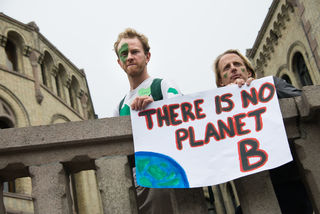Environment
Climate Change Denial
Facing a reality too big to believe.
Posted January 12, 2019 Reviewed by Matt Huston
There are many areas of science and medicine that stimulate reasonable differences of opinion and even controversy. What exactly is dark matter made of? Whose cut-offs for normal blood pressure are the best ones to follow? Is psychoanalytic psychotherapy an evidence-based treatment?
But there are also many points that are clear and not subject to legitimate debate. We can affirm without doubt that anthropogenic climate change is a real phenomenon that is already apparent and will, if not mitigated, cause terrible suffering and destruction before this century is over. A recent report from the United Nations-sponsored Intergovernmental Panel on Climate Change tells us we can still hope to avert some of the catastrophic consequences of climate change, but only if we “abandon coal and other fossil fuels in the next decade or two." Scientists may disagree about how fast the atmosphere is warming or what the best solutions are, but except for a small number of outliers, none doubt that we are rapidly approaching climate catastrophe.
That a few misguided politicians believe climate change predictions are exaggerated or even fabricated is lamentable. But perhaps more puzzling is the lack of alarm among the general public. As monumental hurricanes lash out in Houston and Puerto Rico and California forests burn out of control, it would seem that the evidence that climate scientists are right would be clear enough. Almost annually meteorologists tell us we have just experienced the warmest year in recorded history. Yet even people who experience extreme weather events often still refuse to describe the experience as a manifestation of climate change. Polls tell us that many people are worried about climate change, but that does not seem to motivate much willingness to take action to mitigate it. Others deny that climate change is occurring at all or that it represents any significant threat to civilization.
Why Don’t We Acknowledge Climate Change?
One reason for the refusal to accept the reality of climate change is what is called “motivated interference,” which occurs when we hold a specific bias to ignore evidence. As science writer Nicole Mortillaro noted, this can include a general unease with large government projects that are expensive and interfere with individuals’ lives. Other reasons, she writes, include those of “people whose livelihood is dependent on…the oil industry” and resentment of “government taking money out of [individuals’] pockets in the form of public spending on carbon mitigation efforts.”
In addition to motivated interference, there is also a powerful psychological component to this blindness to scientific reality: denial. A lot has been written about climate change denial and there are clearly many explanations for it. For one thing, an enormous amount of money is being spent encouraging us to ignore climate change. Corporations, especially the fossil fuel industry, have spent huge sums attempting to obfuscate the reality of climate change. We are constantly told by them that “more data are needed” because “climate scientists don’t agree.” While no scientist would ever disagree with a call for more research—that line is, after all, found near the end of almost every scientific paper ever written—it just is not true that scientists don’t agree that climate change is real. To some extent, then, we are the victims of a well-funded and sophisticated misinformation campaign that attempts to keep us in the dark about climate change.
But studies persistently show us that simply providing people with the facts about climate does not reliably change minds. The science that proves the Earth is warming is very technical and difficult for most of us to grasp. “Humans aren’t well wired to act on complex statistical risks,” according to a Brookings Institute report. Even when the evidence about climate change is relayed in very clear terms with lots of compelling graphics, many people either don’t believe it or shrug it off. Hence, the problem of climate change denial is not simply a matter of an information gap.
Too Large to Believe
Among the myriad reasons that we shun this problem is its enormity. We aren’t “merely” being told that unless we take action our identities will be stolen, we will lose thousands of dollars, or even that it will take a few years off our lives. What the climate scientists are telling us is that if we don’t stop burning fossil fuels the human race faces extinction.

We can grasp a potential calamity if we know it is made up and will be okay in an hour and a half. But we resist when that calamity is real, will be spread out over decades, and is of catastrophic proportions that can only be averted if we change almost everything about the way we live. Stop driving your car, eating meat, and flying in planes, we are told. Shut down ExxonMobil, Shell, and British Petroleum. Move quickly to build solar fields and energy-producing windmills. Simply writing that list makes us totally exhausted. What we are being asked to do will take gargantuan efforts and face vicious opposition. “Solving climate is going to be harder, and more improbable, than winning World War II, achieving civil rights, defeating bacterial infection and sending a man to the moon all together,” warn Auden Schendler and Andrew P. Jones. It is very difficult to accept as real a problem that requires this magnitude of solution.
Right now, as we write this article, it is freezing cold in the Northeast and snow covers much of the country. No hurricanes are forecast at the moment and the fires in California are said for now to be under control. How easy it is to shut the bad news away and look to deal with more tractable problems. Even poverty, war, and famine seem more easily solved than climate change.
In one of the most poignant recitations of this sense of being engulfed by the enormity of the implications of climate change, scientist Alison Spodek Keimowitz wrote about her change in perspective after her brush with death from cancer. “I found that I no longer could see a track that turned away from the edge. We are already locked into catastrophic changes, terrible human and animal suffering, the loss of so much of what makes this Earth itself." The problem is just so huge that it is nearly unthinkable. Our minds try to save us from utter hopelessness by pushing aside thoughts of climate change. Denial kicks in as our minds’ default for temporary self-preservation.
Climate change denial is in some ways a new mental process for psychologists to understand. Of course, the concept of denial itself is well understood. Psychologists consider denial—the refusal to accept facts in order to protect us from uncomfortable truths—to be a primitive defense mechanism.
But despite the fact that psychologists know a lot about denial, they have never had to face denial on this scale before. Millions of people share the phenomenon of climate denial. This is clearly not something that is amenable to individual or even group psychotherapy.
Motivating Climate Activism
One approach to motivating us to take action about climate change is to emphasize relatively simple things that individuals can do in their everyday lives. According to this approach, instead of telling people to stop driving gas-powered cars altogether, we recommend trying to take the train to work one day a week. Instead of forgoing all flights, we are asked to skip one international flight a year. The list of these everyday recommendations includes such things as bringing reusable bags to the supermarket to cut down on the amount of plastic that winds up in Earth’s oceans and switching all the lightbulbs in your home from incandescent to LCD.
It is quite clear that such individual steps, however needed, are insufficient to stop climate change, and therefore some environmental advocates believe that emphasizing is contributing to climate denial. Instead of telling people to be more careful recycling soda cans, we should work harder to make them understand that only the complete cessation of greenhouse gas emissions will save us.
Nevertheless, there are at least two psychological reasons that encouraging people to adopt climate-protecting activities in their daily lives may help promote action on the larger scale needed. First, denial is a response to something we fear, and we know from animal and human studies that fear induces freezing and passivity. But studies also demonstrate that giving a fearful animal or human a task that even symbolically addresses what is feared can minimize freezing and promote action. Thus, recommending tasks that we can perform in our daily lives may help us overcome our feeling that mitigating climate change is a hopeless enterprise and motivate us join the voices insisting on ending burning fossil fuels.
Second, these quotidian activities can be the basis for the formation of committees and communities that bring people together with the common goal of addressing climate change. Being part of a group with a common goal may help people overcome denial and have the courage to face the realities of climate change, however grim they may be. It may be easier and more effective for groups of people to demand that countries impose carbon taxes and spend heavily on sustainable energy than it is for individuals.
Katharine Hayhoe, a climate scientist who emphasizes "I am a Christian,” endorses this approach to overcoming resistance to accepting climate change, writing, “That’s why changing minds also requires providing practical, viable, and attractive solutions that someone can get excited about." If we do not somehow muster the excitement that Hayhoe is talking about, we risk watching people become so afraid and overwhelmed that they lapse into total inaction.
Ultimately, only large-scale political activity has any chance of saving civilization from the oncoming ravages of continued greenhouse gas emissions. Entire nations must come together as they did in forging the Paris Climate Agreement and agree to enforce what will have to be very extensive and often highly inconvenient changes in our sources of energy and food. It is true that replacing oil and gas with sustainable energy and switching to plant-based diets will be difficult and even painful for some, but the alternative—continuing to ignore that climate change is already affecting us and will ultimately be catastrophic—is of course much worse.
Mental health professionals are increasingly recognizing the critical role they play in combating climate change. Data suggest that rising temperatures are linked to increases in multiple psychiatric disorders and suicide rates. In an excellent review of the mental health aspects of climate change, a group from the Dalla Lana School of Public Health at the University of Toronto comment that “The overarching threats of a changing climate can also incite despair and hopelessness as actions to address the ‘wicked problem’ of climate change seem intangible or insignificant in comparison to the scale and magnitude of the threats."
Organizations like Climate Psychiatry Alliance and Climate Psychology Alliance have been formed not only to point out the severe consequences of climate change for emotional and behavioral health but also to lend expertise in determining how best to overcome climate change denial. For these and similar organizations, climate change denial constitutes an emergency that demands immediate attention. We need urgent attention to developing and implementing the best practices for overcoming public despair and inaction and increasing the motivation to demand large-scale climate change mitigation action.




